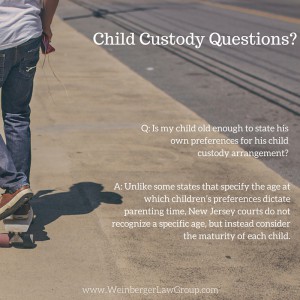Considering Older Kids’ Preferences When Determining Parenting Time Plans
 Parenting time plans developed during a child’s early years may need to be adjusted as a child matures, particularly during adolescence. The 3-year-old who clung to his mother’s legs when Dad arrived for visitation may decide he wants to spend most, or even all of his time with his father as he nears legal adulthood. How are an older child’s preferences taken into account when making child custody decisions?
Parenting time plans developed during a child’s early years may need to be adjusted as a child matures, particularly during adolescence. The 3-year-old who clung to his mother’s legs when Dad arrived for visitation may decide he wants to spend most, or even all of his time with his father as he nears legal adulthood. How are an older child’s preferences taken into account when making child custody decisions?
In New Jersey, the courts use a factor list for custody and visitation determinations (NJSA 9:2-4c) for any minor child. They are:
- the parents’ ability to agree, communicate and cooperate in matters relating to the child;
- the parents’ willingness to accept custody and any history of unwillingness to allow parenting time not based on substantiated abuse;
- the interaction and relationship of the child with its parents and siblings; the history of domestic violence, if any;
- the safety of the child and the safety of either parent from physical abuse by the other parent;
- the preference of the child when of sufficient age and capacity to reason so as to form an intelligent decision;
- the needs of the child; the stability of the home environment offered; the quality and continuity of the child’s education;
- the fitness of the parents; the geographical proximity of the parents’ homes; the extent and quality of the time spent with the child prior to or subsequent to the separation;
- the parents’ employment responsibilities; and
- the age and number of the children.
Among these factors, the law in New Jersey does provide for a child’s preferences, but unlike some states that specify at what age children’s preferences dictate parenting time, New Jersey courts do not recognize a specific age, but instead consider the maturity of each child.
Determining whether or not a tween or teen is mature enough to state their custody preference is decided by the courts on a case-by-case basis. Looking at New Jersey court decisions, there are cases on record in which a 10-year-old was denied the ability to state preference due to maturity level, but a 12-year-old was determined to have the necessary maturity to do so.
If you believe your child is mature enough to form a reasonable preference, one peaceful approach to incorporating the child’s preferences is to have a conversation with that child about his needs and desires in regards to his living arrangements. A parent should facilitate that dialogue not by asking bluntly with whom the child wants to reside, but by asking open-ended questions that invite reflection and a richer conversation – questions like this, for example: “What are you interested in being able to do and how can we as your parents make it easy for you do those things? And how can we make sure that you spend time with each of us?”
When parents are able to listen to their child’s preferences (as long as those preferences are reasonable) are both are in agreement, they can then modify an existing custody order to reflect their child’s preferences without resorting to litigation. If you and your child’s other parent don’t agree on modifying your custody order, despite the older child’s stated preferences, it may help to have a child custody evaluator and/or therapist speak with your older child to verify these preferences and gather further information. A judge may require this before ruling on the modification.
Have questions about your child custody order? Wondering how to take into account your child’s preferences, or whether it’s appropriate for their age? Our attorneys can help. Please contact us to schedule your initial consultation.


